#pederasty mention
Text
getting mad again about how pederasty in ancient greece is talked about in contrast to how marriage is
40+ year old man sleeps with a 14 year old boy he is mentoring- immoral, an abuse of power, bad gay rep (this is an actual argument i’ve seen, what??)
the same 40+ year old man is married to a 14 year old girl- well, that’s just how it was at that time! we can casually overlook how there’s a decent chance she will die as a result of them having sex and her getting pregnant at such an age
#to be clear both are bad#my own classics teacher approached pederasty with a whole spiel about how he knows it’s gross and not romantic#but never once mentioned that Julia was FOURTEEN when she first got married when we learned so much else about her!#you don’t think that might factor in at all to her rampant affairs later in life?#that her dad married her off three times to her cousin and his older friend and her step brother? when she was a teenager?
10 notes
·
View notes
Text
"your secondary research, arguments and ideas were very original and impressive and showed very thorough demonstration. you should be incredibly proud of this work this is genuinely the best i've marked of yours in three years. also i know i told you that structure is subjective and there's no right way to structure an essay but you structured this wrong and your title is very wordy lol so here's a 66"

#I am so severely praying on her downfall she has no idea#i was going to be mysterious and not rant in the tags but i NEED TO omg#she wouldn't stfu about 'i want original ideas. give me something ORIGINAL GUYS'.#and this woman i'm absolutely convinced has it out for me because she has nitpicked and destroyed every single assignment i've done for her#(she marked me down for an audio recording of a presentation because apparently i didn't handle the subject matter 'maturely')#(she thinks i didn't want to say the words breasts or folds)#(I didn't CARE i was literally just out of breath from trying to fit 20 slides into a ten minute voice note but FINE WHATEVER)#so anyway for this essay i was like fucking bet i'm about to blow you away#but there was nothing she taught us in the seminars that was really worth expanding on#or that hadn't been taught or talked about before#so i went ahead and did this massive essay on eroticism of the decadence period. fin de siecle. victorian hellenism etc#all the research btw i did myself because all this woman did was mention pederasty maybe once in person#and she had the nerve to mention that i had 'planted the seeds for a first tier essay' like WHAT DOES THAT EVEN MEAN#if the only thing that it lacked was 'slightly awkward structure' 'occasional referencing mistakes' and a WORDY TITLE#A FUCKING WORDY TITLE#WHY NOT JUST GIVE IT A 70#noooooo she had to be different couldn't even give me a 68. fucking 66.#absolute tramp i fucking hate this woman idc#she's my personal tutor as well how absolutely useless
5 notes
·
View notes
Note
could you share your thoughts on Christianity and the lgbt community? Not in a like "'oh yeah well how are you this and that if you're REALLY Christian"' kind of way, I'm asking from the perspective of someone who's been struggling with their spirituality because I don't know how I can believe and god and also be gay. Feel free not to answer this though, you shouldn't have to explain yourself to random people every time you mention your religion
There’s not a lot of mentions of what we would consider to be homosexuality in the Bible. Paul mentions it most explicitly but there’s some important things to remember about Paul. First, he’s just some guy. He did important work spreading the religion but that doesn’t mean that he’s right about everything. Second, his only exposure to homosexuality likely came from the Roman elite. And the way they did it usually involved raping slave boys and hiring young prostitutes. They didn’t usually have same sex relations in the way we think of them now. Men didn’t generally have romantic relationships with each other into adulthood and a full adult citizen being passive during sex was considered to be scandalous. Any actual romantic relationships between adults of the same sex were likely kept secret or at least weren’t talked about loudly. So Paul is living in this environment. And people aren’t completely separate from the environments they live in.
For the most part stuff in the Bible that’s translated as condemning homosexuality is referring to certain cultural practices common in the Mediterranean at the time that we also wouldn’t like today. Such as pederasty, also known as a romanticized form of pedophilia that even people at the time in cultures that practiced it heavily criticized. Consenting adults often did have romantic or sexual relations together but they weren’t commonly open about it.
Overall, the Bible just doesn’t have much to say about liking someone of the same gender if you look at instances outside of things alluding to some of the worse stuff the Greeks and Romans did. So if the Bible doesn’t say much about it, that leaves it up to us to logically deduce our personal feelings about it.
Okay. So what are the two main commandments Jesus gives us? Love your neighbor as yourself, and love god with all your heart, soul, mind, and strength. Basically: love God, love others, love yourself. These are said to be the rules that all other commandments stem from and supersede all other commandments in terms of importance.
So. Does being queer stop you from loving God? Loving others? Loving yourself?
Science is real. It helps us learn more and more about the universe God created all the time and science has proven time and time again that being queer isn’t a choice and that people are happier when they live more authentically.
God made you the way you are. You cannot control whether you’re queer or not. So it’s not a mistake in you that can be “fixed”. If humans were made in the image of God, you too are an image of God. So some tiny part of God, however small, looks like you. All of you. Including the queer parts.
So then. Are you loving God? Including the parts of God that are like you? Are you loving your fellow humans? Including your fellow lgbt humans? Are you doing your best to love yourself? Every part of yourself?
I don’t take the Bible fully literally. You can’t. It contradicts itself constantly. But even if you did, the world it was written for and the society that made the oral traditions it was based on no longer exist. At least not in the exact same way they once did. What the Bible does have in it is stories that can give us examples and have informed the formation of our culture as Christians. Christianity has changed a lot over the last 2,000 years. Many forms of it have come and gone. Ultimately it’s up to us as modern Christians what kind of world we want to be apart of and contribute to and what culture we want to make among ourselves. I can’t pretend to know the true nature of God but I do know that God inspires me to reduce suffering and speak up for injustice where I can.
Ultimately your interpretation is up to you. But I personally don’t see needless self flagellation over something you can’t control as an act of justice or love. Just a form of self torture that’s ultimately not adding much to the world. Adding some of your own happiness to the world in my opinion isn’t a problem.
If you want to know how being queer has affected my faith, I’ve never doubted for a second that being lgbt+ is fine. To be honest I’ve been more afraid of secular society not accepting me than God. God and I have wrestled before, but almost never over that. I am how I am and if God didn’t want me to be this way he probably wouldn’t have flipped the gay switch in my brain.
265 notes
·
View notes
Text
Alright, gonna be posting the translation stuff and other Mononoke-related stuff here going forward, anyway!
Got the second story from the Mononoke book translated and edited. Took me a while to get what this one was going for, and I think I still don't necessarily understand all of it even still, but is it really Mononoke if you're not sitting there staring at the screen like 'wtf' for at least some of it and going to need a few exposures before it really sinks in?
And if you haven't had a chance to check out the first story (Kamaitachi) and you would like to, you can find it here
So again, obligatory disclaimer that I don't own any of the rights to this book and this is just a fan translation done by someone making slow but steady progress in Japanese. You can buy a digital version of the raw version of the book on Bookwalker for $5 (i need to find the link for that again, but that's where I got it)
And then, for content warnings, let me know if I missed any big ones:
-Mentions of period-accurate pederasty
-Graphic depictions of violence
-Attempted ritual suicide
-Body horror
With all that being said, here's link to the translation below:
I also just want to check in, is sharing through Google docs generally accessible for everyone or would there be a better format to share it in? If I knew more about OTW policies on fan translations I would rather stick it on ao3, but since I don't and since this isn't fan fiction I'm playing it safe and not going that route for now, but if anyone's got suggestions for a more convenient way to share, I'd appreciate it
That's it from me for now, hope y'all enjoy :)
#mononoke#mononoke 2007#mononoke 2024#mononoke book#mononoke kusuriuri#mononoke medicine vendor#mononoke kamehime
35 notes
·
View notes
Note
hey! i love your ‘Books’ piece and it got me interested in old european gay literature (as i honestly forgot that such a thing could exist). Do you have any recommendations for books in english? (or russian?)
Hmmm I think rather than recommending specific books, I’d urge you to check descriptions and read the ones that sound interesting to you. A lot of the influential early lgbtq novels live only in the subtext, and when it’s textual they often end tragically, or depict pederasty, and there are these that end in a happy romance but wich weren’t necessarily impactful, so I find it difficult to recommend something…
You can start with these helpful wiki articles:
(Don’t mind the mention of Stonewall - it lists novels from all over the world)
(This one sorts novels by centuries)
The biggest issue with these lists is that when it comes to novels from outside the Western world they only feature books with textual homosexuality (somehow these lists don’t fail to mention the western subtextual ones, but let me not be too bitter)
So um another thing I found useful is essays and anthologies written by queer studies scholars. Eg in Polish we had “Dezorientacje: Antologia polskiej literatury queer” published in 2021 which lists our earliest queer writers and the queer subtext in early Polish lit.
I’m sure that there are attempts at documenting queer history in every country, so please do try to look into it !
123 notes
·
View notes
Note
Also the ancient Greeks weren't exactly progressive, iirc they looked down on the non-penetrative partner in m/m relationships and women were not allowed to be lesbians because they were still seen as property to men back then. It's kinda weird how people idolize ancient Greece as some kind of gay haven just because they didn't stone men for having gay sex when those men were usually still expected to marry women and have kids with them, as with most places in the world back then
yeah exactly. the ancient greeks were not "progressive" in any way that people imagine today, it was just a totally different lifestyle headed almost entirely by patriarchy + misogyny because women pretty much were not allowed to leave the house while the men could go out and do what they wanted. not to mention the "gay sex" people imagined they were having all the time was straight up pederasty, it was a fucked up exploitative hierarchy and not at all a "gay haven" as you said. people genuinely have no idea what they're talking about and get all their knowledge from song of achilles and percy jackson, it seems.
19 notes
·
View notes
Text
Animation Night 164: Yaoi, Yuri
The fashion on Tumblr lately has been to divide everything in the world into yaoi and yuri, hasn't it? Well, tonight we don't need to make any abstract stretches of the imagination: it's time for anime where boys kiss boys and girls kiss girls.

So. Five minutes ago, before Tumblr deleted it, this post was off to a pretty good start! I was happily explaining about the differences of nuance between 少年愛 shōnen-ai, 耽美 tanbi, ジュネ june, やおい yaoi and ボーイズラブ bōizu rabu on the one hand, and on the other, why 薔薇 bara (rose) isn't a genre title but nevertheless the editor of 薔薇族 Barazoku ('rose tribe') magazine coined 百合 yuri as a distaff counterpart, the 'lily tribe', and that really caught on.
I was starting in on a brief sketch of some history, how Tokugawa Japan was super gay and had a defined set of social rules for gay relationships in the form of 男色 nanshoku, but this was squashed by the Meiji restoration, and thus gay manga became a subgenre cultivating its own specific otaku audience.
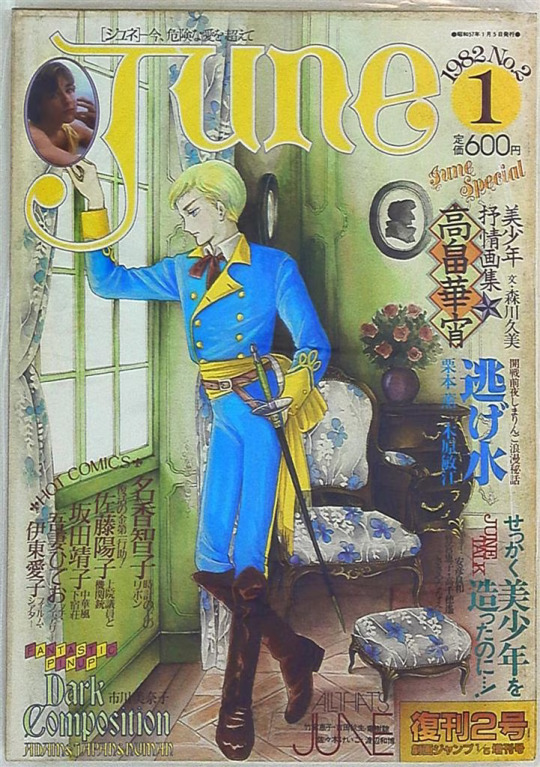
So then I was gonna tell you about how the early shōjo manga focusing on gay relationships, taking the old term shōnen-ai [which originally referred to pederasty], were quite nerdy and literary, but the subgenre rapidly grew in the 70s and 80s, cultivating an otaku audience of its own - primarily women termed, somewhat disparagingly, 婦女子 fujoshi but this demographic breakdown is certainly not absolute and there is a term for male fans, which is 普段し fudanshi. We coulda gone into the whole world of doujinshi, of the massive convention comiket; I coulda cracked open Kimi Rito's History of Hentai Manga for some interesting tidbits about how certain images become encoded as symbols and then reused routinely in manga.
And you know, I might have talked about how this is distinct from manga aimed at gay readers in gay magazines (like the above mentioned 薔薇族 Barazoku) which might be termed ゲイ漫画 gei manga. Perhaps we might mention here the upcoming adaptation of gay manga meme sensation kuso miso technique:
youtube
I was maybe gonna talk a little about some of the older genre conventions of BL; the masc top or 攻め seme and the effeminate bottom or 浮け uke; maybe a little about how yaoi fandom got exported into anime fan culture in the West and the strange phenomenon of the 'yaoi paddle'.

...well, it looks like I managed to skim over all that anyway. Spite works wonders for typing speed, it turns out. But believe me, that's really just surface level stuff. We're working on a followup to the legend of Animation Night 69, so we'll be able to get in a lot deeper in a few weeks~
Anyway, even today, BL and yuri works rarely get adapted into anime in a particularly high profile way. But 'rarely' is not never! In Animation Nights past, well: on Animation Night 69 we watched the delightful 風と木の詩 Kaze to Ki no Uta (The Song of Wind and Trees), an OVA adapting the seminal (ha ha) shōjo manga about a French twink at boarding school. That was the direction of Yoshikazu Yasuhiko, known also for Venus Wars and definitely the subject of a future Animation Night, it was as moving and melodramatic as you could hope from 70s shōjo. Sayo Yamamoto (AN36) brought us the incredibly charming figure gay skating series Yuri on Ice; and then of course Kunihiko Ikuhara (AN155), bless his heart, made his always bold statements on yuri with Yurikuma Arashi ('Lesbian Bear Storm') and BL with Sarazanmai, which I will surely cover if we ever reach the point where we're like 'let's marathon a TV anime' again ;p
Tonight though? We'll be looking at a couple of relatively recent films on both sides of the fence.
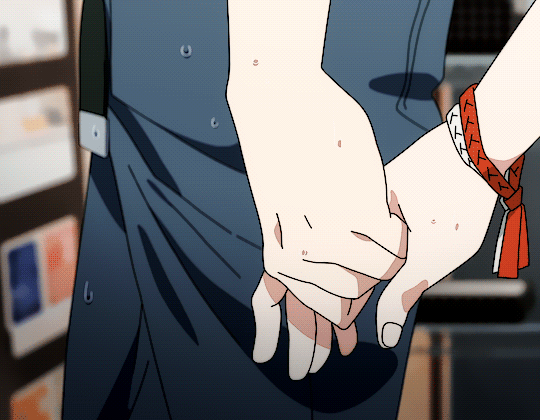
For the BL wing, we have the film 海辺のエトランゼ Umibe no Étranger, aka L'étranger de la Plage or Stranger by the Shore. Kanna Kii, the mangaka, had previously worked as an animator at Studio Hibari, a small anime studio that dates back to the late 70s and broadly seems to specialise in shōjo. Kii returned there to design characters and supervise the film, and evidently Hibari were very excited to adapt the work of their alumnus, because they absolutely spared no effort.
The story centres on orphaned highschooler Mio and his neighbour Shun, an aspiring gay novelist on a remote island in Okinawa. The pair grew close three years before the start of the story, but Mio had to leave Okinawa; we join him now as he returns to that same shore, still holding feelings for Shun.
I'll admit, I don't know a ton about this movie - but it comes highly recommended by kvin who described it as one of an 'oasis' of strong BL works released around 2020. And the clips I've seen - well, they're the gifs used in this post, really nicely drawn scenes of affection. So I'm pretty excited!

Our yuri wing... well, there's a few good choices for yuri TV shows I could show you, but tonight it's late and we need something short and sweet, and that really narrows the field! What I have is あさがおと加瀬さん。Asagao to Kase-san [Kase-san and the Morning Glories], a one hour OVA adapting the manga 加瀬さん Kase-san by Hiromi Takashima. The OVA starts partway into the manga, when plant nerd Yui Yamada has already started dating her crush, the athletic Tomoka Kase. It follows the trials of the girls' relationship as they are coming towards the end of their time at school - relatively low-key, slice of life first relationship typea thing.
The animae was adapted by studio Zexcs under the direction of Takuya Satō, who you might remember as director of the first part of Armitage III [AN153]. Zexcs spun out of JC Staff at the end of the 90s, and they've been pretty busy since then - for me their most notable creation is Aku no Hana (The Flowers of Evil), a truly unique rotoscope anime with an incredibly engaging, tense story about teenagers and the imp of the perverse... which sadly never got the love it deserved! yes I'm still beating this drum!
Anyway, while I have not been able to find a ton of production information, I am told at least that Kase-san was a passion project for Satō - evidently a yuri fan given he also took on the adaptation of Otherside Picnic. It began first with five-minute web adaptation Kase-san and the Morning Glories in 2018 that's more of a musical montage of moments from the series, which was then able to be expanded the next year into an hour-long OVA...
youtube
A lot of romance stories focus on the characters getting together, so it's interesting that this one skips right over those chapters of the manga and gets going once the characters are already together, focusing more on the trials of an ongoing relationship between two goofy hormonal kids trying to figure out if this is just a class S thing or something that they want to last. A great deal of effort is put towards character animation, intimacy, the little flinches and reactions. You can read a little discussion about it here on ANN.
So! With apologies for the late start once more (T_T), it's time to begin! Animation Night will shortly be live at twitch.tv/canmom, and I hope you'll join me for a gay old time~
61 notes
·
View notes
Text
Notes on Craig Williams' Roman Homosexuality, chapter 2! This time we're focusing on how "Roman" or "un-Roman" different sexual practices were, and how Romans reacted to Greek influences. Warning again for non-explicit references to pederasty, slavery, and what we'd now consider rape.
Acceptance of homosexual relationships predated Greek influence in Rome, and Romans didn't see homosexuality as a particularly Greek custom.
However, the open acceptance of sexual relationships between men and freeborn boys - pederasty - was unique to Greece. Roman freeborn boys were supposed to be off-limits.
Hence Roman women, children, and young men were supposed to guard their pudicitia, roughly "sexual integrity," or "chastity." In theory, anyway. And slaves of any age or gender couldn't have pudicitia, because their bodies weren't their own. (I wonder if this may be partly why ex-slaves were still looked down on sometimes, because they were seen as having "lost their virtue"?)
On the other hand, it was much more socially acceptable for Roman men to be attracted to adult men than it was in Greece. Although both Roman and Greek writers talk about the "flower of [male] youth," i.e. the attractiveness of teen boys, only in Roman sources do we see relationships between adult men mentioned in a neutral or positive manner. The Romans also talked openly about male prostitutes who were full adults or acted as the penetrating partners. However, a Roman man was still expected to only have such relations with slaves or prostitutes, not with other free Roman men, and he was supposed to be the penetrator and to act masculine in public.
(Note: if any one has examples to the contrary, please let me know! I was really surprised by Williams' claim that this was more accepted in Rome than in Greece.)
In practice, Roman and Greek sexual relationships were very diverse, just as they are in our time. But Williams is focusing on the cultural norms men would have been judged by, and the language they had available to describe themselves.
Roman traditionalists decried Greek influence, but they mainly objected to what they saw as unnecessary luxury, overindulgence, military weakness, and effeminacy, not homosexual practices. "Overindulgence" could include excessive sexual activity, which critics usually put in the same category as other appetites like food and wine, but it's the degree of luxury they criticize, not the gender of the participants.
In another book (I think it was Mary Beard's SPQR) I read that the Roman virtue of austerity was constructed in response to the growing empire, and wealth and foreign peoples flowing into Rome. Rome's laws permitted many non-ethnic-Romans to gain citizenship through manumission. Thus the idealization of "old-fashioned Roman austerity" may have been an attempt by Romans to differentiate their culture further from what they saw as the luxuries and "decadence" of the Hellenistic world.
18 notes
·
View notes
Text
It's so fucking annoying that whenever one particular distorted view of a complicated and nuanced history gets widespread enough to trigger a backlash, people counter with a view that's just as distorted but in the other direction. Like sure it's highly inaccurate to act as though the sexuality morality of "Ancient Greece" (a term that covers hundreds of years and dozens of city states, not to mention countless hinterland villages with a greatly varying array of relations to their dominant Polis) was some wholesome homosexual paradise that perfectly aligns with modern Anglosphere ideas of Queerness, but it's just as inaccurate to boil every form of same sex relationship to "old men raping little boys". Like I'm not saying that Hellenic pederasty, which was a major feature of socialisation in many Greek communities for up to several hundred years, should be ignored or whitewashed but to act as that covers the entirety of Classical Sexuality is ridiculous
8 notes
·
View notes
Text
Aliakai
TW: Antisemitism
Aliakai#0945
253038952934670336
The pagan YouTuber Aliakai (she/they) attempts to present herself as a community figure, but is rife with problems ranging from toxic debatebro rhetoric and misinformation to antisemitism.
She is a hypocrite, constantly railing on Christianity and the Bible, including the Old Testament, which Christians barely use, and treating the Odyssey as a Bible. This is neither historically accurate nor the intended purpose of ancient Greek myths.
Her anti-”monotheism” runs constantly throughout her platforms, and one could say this is their most consistent issue.
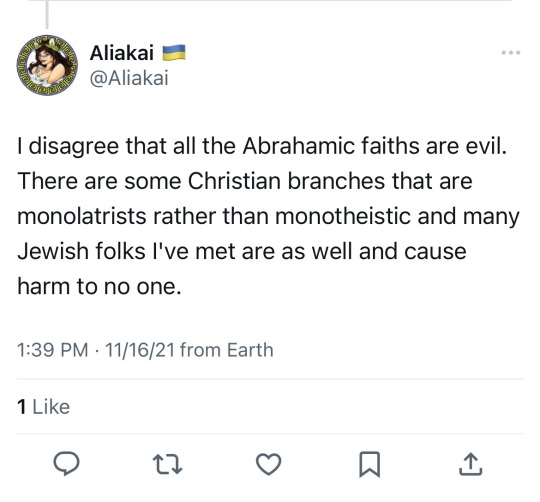
Tweet archived here.
As for Aliakai’s antisemitism, it requires a deeper look. In this video, we find multiple instances of their antisemitism. Referencing the Old Testament to try to defeat the Christians just ends up being antisemitic almost every time. They repeatedly bring up Elohim and specifically Jewish stories in their attempt to “debunk” or “out-logic” Christianity. The Old Testament isn’t meant to be a strict rulebook - it’s also a collection of stories, a fact which Aliakai seems to purposefully ignore.
They talk about Sodom and Gomorrah and the sins committed therein as if the two cities were not specifically written to be bad examples. Additionally, ancient Greeks famously abducted women as the spoils of war. It is incredibly hypocritcal to judge mythical Sodom and Gomorrah without even a mention of the known, historical practices in ancient Greece. She then ties homophobia to the fact that God smote people with hemorrhoids, once again, in a Jewish tale. She is aware that the infamous Leviticus quote is likely about pederasty, but continues to use it to try to posture Judaism and Christianity as inferior anyway.
Aliakai criticizes the God of the Old Testament for smiting Job when Apollo also smites Cassandra in an equally cruel manner.
She then claims that Exodus is actually about punishing Egyptian gods and that the pharaoh is somehow the true victim in the story, not the enslaved Jews.
She also implies everyone takes the Bible literally, committing the common fallacy of equating all Christians with dangerous evangelicals. There is no “common Christian theology” as she claims. They are also condescending to trinitarians, while simultaneously assuming all christians are trinitarians. The text of the Bible does explicitly refer to the Trinity, contrary to their statement.
Any attempt to try to find plotholes in the Bible is pointless, and the amount of time and energy Aliakai wastes is akin to an atheist in 2016.
Here are some furtner examples of Aliakai’s antisemitism:
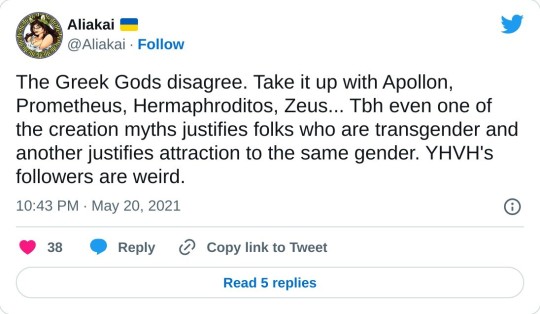

(Archived first link)(Archived second link)
Here she implies Christianity and Judaism are the same faith, which anyone knowledgeable in either should be able to tell you is both incorrect and a dangerous statement.
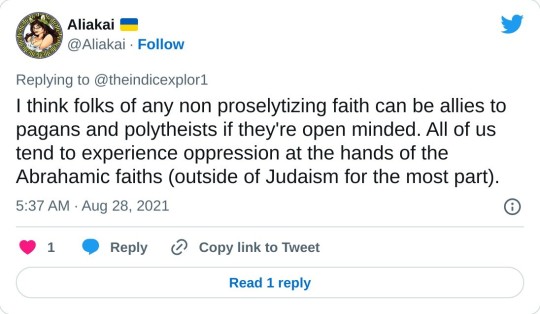
(Archived here)
This shows an incredibly poor understanding of how religious oppression is currently functioning in society, and again demonstrates their anti-monotheism. Do we need to discuss Myanmar’s militant Buddhist genocide of Rohingya Muslims, for example? Or Hindu lynchings of Muslims? The list goes on.
Aliakai’s archived talk for the Hindutva org Indica here. To her credit, she did sever her relationship with Indica (archived). However, for a politically inclined youtuber who can research, this is a dangerous lack of vetting. Same can be said of the others who partook, of course.
Despite disavowing Indica, they never disavowed Butler, who is undeniably a fascist. In fact, Aliakai continues to recommend Edward Butler a year after the community-wide revelation of his fascism.
Here is her only acknowledgement of Butler's fascism (archived), without explicitly agreeing or disagreeing with the blogger's criticism of him.
In this Tweet (archived), they are making a lot of assumptions about Butler here and being too generous.
They give Butler a lot of leniency despite his years-long, public love affair with fascism. This is an extremely weak willed response to finding out an associate is fascist. This is not antifascism. This is not accountability.
In this video, Aliakai tries to present a case for making an SPG more official of Ares and mental health. In this video, around 8:03, she hints that Ares is the god of police officers who brutalize protesters. Considering police brutality and the unjust use of police violence, this is incredibly insensitive and quite racist. Police do not have anything to do with justice, and claiming as much for a shared community experience is bold.
Performing a Hellenic ritual for Ukraine with a Heathen without involving any Slavic pagans is morally questionable, as is claiming Ukraine is dedicated to Demeter’s arts. This is an act of further colonialism against a country currently being invaded by imperialist forces.
Asking viewers not to invoke Eris simply because of personal beef for a supposedly aid based ritual is infantile.
#aliakai#hellenic paganism#pagan community#paganism#pagans of tumblr#witchy#witchcraft#hellenismos#helpol#hellenic polytheism
48 notes
·
View notes
Text
Hi lovelies,
Guys. This blog. Is one years old today! Woah. Icl I’m really bad at sticking to things so the fact that we managed to get a post every week for a year is pretty cool, so thank you all :)
As it’s pride month (happy pride!!) I’ve been seeing a lot of things on Twitter celebrating queer figures from classical antiquity, and whilst there were definitely queer figures to be celebrated, I think there is a lot of misconceptions about sexuality in the ancient world (especially Greece and Rome). So today I thought it would be cool to talk about male and female sexuality in the Ancient Greece and Rome. Quick trigger warning, there are mentions of pro5tituti0n, r4pe, and sl4v3ry, so read at your own risk and please stay safe <3
Okay so just some quick things to understand. The term ‘homosexual’ wasn’t coined until the the late 19th century, and the word bisexual until 1892. In regards to Ancient Greece, it was a largely homosocial, if not ‘homosexual’.
So starting off with Ancient Greece. Potential sexual partners for men included other free men (in the realms of pederastic relationships), wives, pro5titut3s, and both male and female slaves. Pederastic relationships were the main form of homosexual relationships and it was basically a socially acceptable, educative and erotic relationship between an adult male (mid-20s to 30s) and a younger male (mid-to-late teens to early-twenties). The older lover was called the erastes (lover) and the younger was called the eromenos (beloved). The erastes had to pursue the eromenos (usually at the gym) and it was his role to provide education for the younger in the areas of politics, philosophy, rhetoric, and social customs (basically how to be a good citizen). In return, the eromenos would provide the erastes with sexual pleasure, but key point it wasn’t penetrative pleasure because (oh no) that would be too gay. Stupid I know, but basically penetrative s3x would, to them, make one of them ‘feminine’ and in a highly highly misogynistic society that just wasn’t the done thing. But there is evidence to suggest that quite a few men ignored this social convention. For example, in Aristophanes Frogs, they mention a politicians called Cliesthenes who has broken this tradition and in Plato’s Symposium, Pausanias and Agathon. Anyways! The erastes was chosen for his beauty, so the more beautiful you were the better erastes, and therefore education, you would receive. It is really important to note that for the erastes, this wasn’t allowed to be his primary sexual relationship, in that it was expected of him to be married and that his primary relationship was for the purpose of childbirth. Another partner for men in Ancient Greece was was pro5titut3s, and there were two levels of this. The first was the pornoi, who were ‘street workers’ and were slaves (male or female) owned by br0th3l owners. The second levels was the hetairai who were highly educated female courtesans, a mix of free women and slaves, and were primarily seen at drinking parties.
There is little that is know about the sexual partners of women in Ancient Greece but its largely agreed that women could only have male/female relations with their husbands, but as long as it didn’t get in the way of having children, they could also engage in relations with other women. Sappho’s works suggest that this was often the case before marriage.
In Ancient Rome, the potential sexual partners for men included their wives, infames (male or female), slaves (male or female) and extra marital affairs. So starting off with infames, this was a person- that because of their profession) had no legal status in Rome (so actors, gladiators etc…). Because of the focus on the active and passive members of the relationships, the free man always had to be the ‘active’ and the infames the ‘passive’. Generally when it came to homosexuality, romans did not have pederasty and if a roman man wanted to have sex with another man they could as long as they weren’t the passive one, because if a freeman was the passive one it would damage his virtus. Again, like in Ancient Greece, this wasn’t a mans primary relationship and he is still expected to have a wife for the purpose of childbirth. Because of this, relations with male slaves became popular and the term ‘puer delicatus’ (delicate boy) was often applied to slave boys brought specifically for this purpose. Similarly to Ancient Greece, it was encouraged for men to have relations with pro5titut3s and exploit household slaves. Adultery was, however, outlawed but the Lex Julia. BUT, this was hugely hugely unpopular and historian Gaius Suetonius described the reaction as ‘open revolt’. This suggests that extramarital affairs were accepted and popular. Ovid literally has a whole book about pursuing married women and succeeding, which tells you all that it needs to.
In regards to women in Ancient rome, there again isn’t a lot that is known. But Ars Amortia book 3 suggests that women did have extramarital affairs and some form of sexual liberty.
In all, heteronormativity wasn’t as enforced in the ancient world because, in all honesty, they cared more about who took on the ‘feminine’ role, and so their sexual liberty didn’t come from acceptance, but straight up misogyny. Also I read this really fascinating thing that basically said that in todays world where we enforce heteronormativity, we can’t assume that everyone who says they’re straight, is in fact straight. In the same way, to the ancient world where (and forgive my use of modern terminology) homosexuality was expected, you can’t assume that everyone who said they were ‘homosexual’ or ‘bisexual’ actually was. Sexuality has, and always will be, flexible and diverse and deeply fascinating and so you can’t enforce labels on the ancient, or indeed modern, world. It’s fluid and whatever you want it to be, but either way, I hope you all found this interesting!
Thanks for sticking with my awful ramblings for the last year, I love you all loads, and I hope you all have a lovely rest of your weekend <33
~Z
#classical studies#dark acamedia#pride 2023#pride#happy pride 🌈#classics#greek mythology#ancient rome#roman mythology#ancient greece#ancient world#history#hellenic deities#patrochilles#tagamemnon#greek history#roman history#sexuality#gay
32 notes
·
View notes
Text
Reading the Renault fandom dissertation, part 5: more Renault fandom analysis
An academic, Jui-an Chou, wrote about us, online fans of Mary Renault’s works, as part of her phd dissertation in 2018 at Duke University. As the subject of her research, I have a few thoughts.
(Here is part 1, part 2, part 3, part 4 and part 6 of my series of posts on this TC fandom study)
In part 5, we continue with Chou’s analysis of the online Renault fandom, with the focus now shifted to tumblr fan art. The dissertation does not credit the artist of the piece below, but the tumblr source link takes us to @februeruri, a popular fan artist for both TC and Renault’s Greek novels.
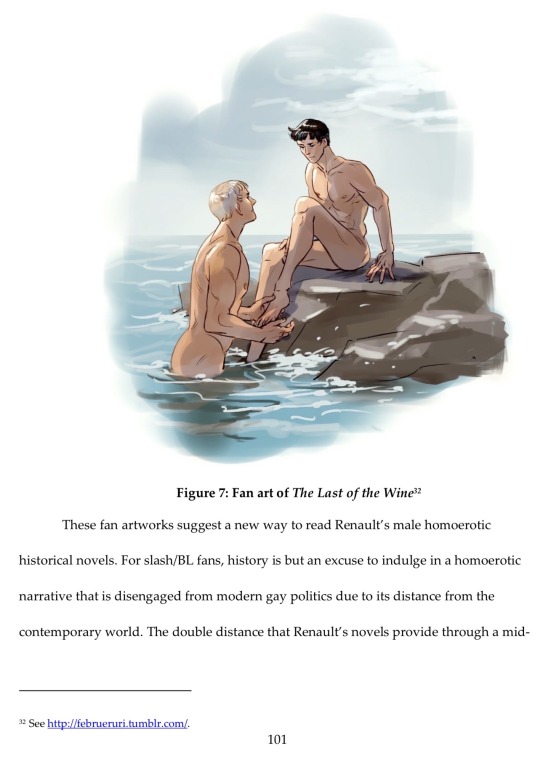
Here is what Chou has to say about the artwork above:
“In contrast to the previous artwork, this piece strips away the Greek setting, leaving two young male bodies at the center of the work, again engaging in suggestive gestures and looks. Both artworks incorporate Renault’s novel but strip away its references to Greek life, politics, and the historical specificity of Greek pederasty, extracting only the young male couple that embodies the ideal of romance and erotic tension in slash/BL aesthetics.”
I think Chou’s argument that the artwork strips away historical specificity in order to focus on idealized romance are unreasonable and slightly absurd. The art work above faithfully depicts a scene from The Last of the Wine where the two protagonists are on an isolated beach where they share an erotically charged moment. Since the scene takes place outside their familiar urban environment and away from the presence of other people, an artistic adaptation of it cannot be reasonably expected to depict Greek life, politics, and institutions. Just as no one would reasonably expect an artist drawing a modern greek couple skinny dipping on an isolated beach in 2023 to also portray contemporary Greek life, politics, and institutions in the same image.
As I mentioned in an earlier post, Chou’s decision to focus on fan art for Renault’s works is not only flawed but also conveniently serves her argument that Renault’s online fans fail to engage with the “reality” of queer life. Unlike Japanese BL manga, which uses text alongside illustrations to convey its messages & storytelling, online fan art does not, as a genre, usually use text to flesh out the context of its subject matter and explore its ties to historical and present reality. Instead, historical specificity and analysis is more likely to be found in fan fiction and meta (fan analysis posts & discussions), where the primary medium is text.
“These fan artworks suggest a new way to read Renault’s male homoerotic historical novels. For slash/BL fans, history is but an excuse to indulge in a homoerotic narrative that is disengaged from modern gay politics due to its distance from the contemporary world.”
By choosing to focus her close analysis only on illustration (and completely ignoring fan fiction and fan essays), Chou sets up the online Renault fandom to fail her test of “historical specificity” and intellectual engagement with modern gay politics (not to mention that literature & fiction does not have an obligation to engage in politics. Why make art or write fiction in the first place when you can write a treatise?).
This flawed methodology enables her to then come to the to conclusion that:
“History, both of ancient Greece and Renault’s mid-twentieth century, serve as fantasy material for 21st-century fans. History promises a world in which beautiful boys are free to fall in love with each other without social persecution and without the need to “congregate” and to wave banners in the streets. In this sense, Renault’s relationship to politics is surprisingly closer to her 21st-century fans than to her gay readers in the 1950s to the 1970s.”
Chou once again makes a baseless assumption that we (the online fans of Renault’s works) all agree with Renault’s political views and don’t care about LGBTQ+ political rights. First of all, fandom spaces are not primarily spaces for political activism & organizing. I do care about my political rights, but fandom is a place for fun & socializing! I don’t want to devote every aspect of my life to politics. That’s exhausting! Besides, there are plenty of online spaces devoted to queer political work. Furthermore, because Chou chose to ignore the fan fiction and analysis produced by the online communities she studied, she was unable to see all the ways that many fan writers did engage with “real issues” such as internalized homophobia, trauma, persecution, conflicts within the queer community, the desire and struggle to find belonging and love.
As Ralph Lanyon would say, she’s working up queerness into a religion, rather than just something that one simply is.
Continued in part 6
12 notes
·
View notes
Note
Greek classics? That's very Obikin. I feel like they would fit in nicely among the ancient Greeks.
absolutely! i am a reincarnated patrochilles obikin truther.
it's super fascinating and easy to see why this is a popular parallel for those that ship obi-wan and anakin because like obikin, patroclus and achilles have the same brother-in-arms mentor/student-esque dynamic. not to mention they have a ton of speculation about the nature of their relationship, which i find quite funny when thinking about an encounter between obi-wan’s ex lover taria (?) when speaking to anakin, which you can find here. keep in mind this is right around this particular exchange.
patroclus/achilles are a good example of greek pederasty and erastes/ eromenos, and to some, obi-wan and anakin’s dynamic can fit into that relationship as well. this sort of shapes my perception of them VERY much.
i also made a post here that draws some parallels from a popular retelling of patrochilles by madeline miller that i enjoyed, but you may find similar quotes throughout the illiad that i think wonderfully parallel quotes about obikin in karen miller and stover’s novels. i'd like to list a few for you!
"Patroclus has fallen - he whom I valued more than all others, and love as dearly as my own life? I have lost him." and here’s another translation of the same quote: “My dear comrade’s dead - Patroclus - the man I loved beyond all other comrades, loved as my own life - I’ve lost him.”
i love the above quote compared to this:

“Son of Menoetius, my heart’s companion.“
there are a few quotes that i like to pair with this, but i think i prefer this one: “Anakin.” Obi-Wan’s voice had gone soft, and his hand was warm on Anakin’s arm. “There is no other Jedi I would rather have at my side right now. No other man.”
and finally:
“A last request - grant it, please. Never bury my bones apart from yours, Achilles, let them lie together…So now let a single urn, the gold two-handed urn your noble mother gave you, hold our bones - together.” (cough: obi-wan burying he and anakin’s sabers - their figurative LIVES, mind you - together in kenobi)
and of course, this quote to pair: Contemplation of death brought only one slight sting of regret, and more than a bit of puzzlement. Until this very moment, he had never realized he’d always expected, for no discernible reason— That when he died, Anakin would be with him.”
there are a few other posts by awesome people in the fandom about this that cover other quotes and angles, but i hope this was a fun read! thanks <3
#obikin#patrochilles#obikin as patrochillies#meta#obikin meta#quotes#vaderwan#anakin x obi-wan#anaobi#obiani
121 notes
·
View notes